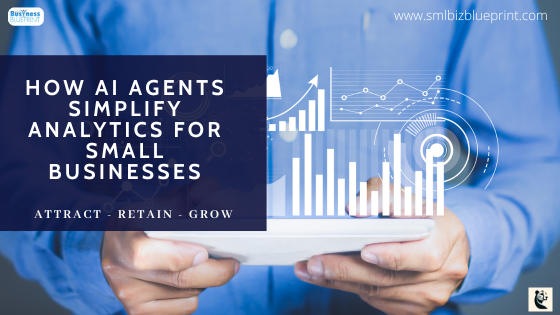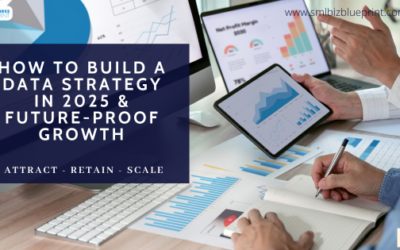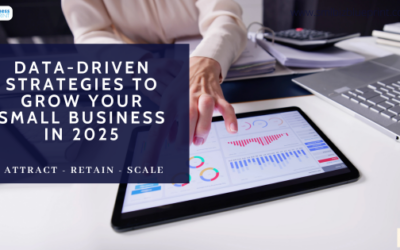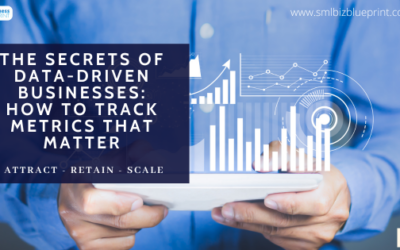In today’s competitive business landscape, making informed decisions based on data isn’t just an advantage—it’s a necessity.
Yet, for many small business owners, analysing data can feel overwhelming, time-consuming, and out of reach. This is where AI agents come into play, revolutionising how small businesses approach analytics and empowering them to make smarter, data-driven decisions.
Did you know that 70% of small businesses say managing and interpreting data is one of their biggest challenges? (Source: Deloitte).
Without the right tools, valuable insights are often lost in spreadsheets and reports, leaving businesses struggling to identify opportunities or optimise their operations.
This post explores how AI agents simplify analytics for small businesses, offering accessible solutions that can help streamline processes, uncover trends, and drive growth.
Whether you’re a retailer looking to predict inventory needs or a service provider aiming to understand customer behaviour better, AI agents provide the clarity and speed you need to stay ahead of the curve.
In the sections ahead, we’ll discuss how AI agents work, the benefits they bring, and practical ways small businesses can get started with this transformative technology.
By the end of this guide, you’ll have actionable insights to harness the power of AI for your business and turn data into a competitive advantage.
Let’s dive into how you can make data-driven decisions simpler, smarter, and more impactful.
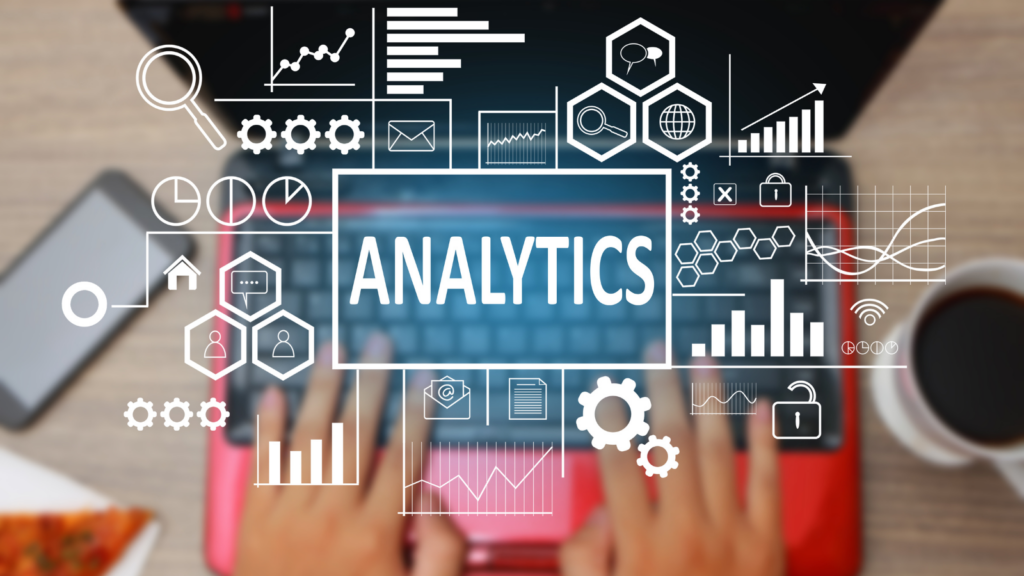
#1 What Are AI Agents and How Do They Revolutionize Small Business Analytics?
Data is often referred to as the lifeblood of modern businesses, but without the tools to analyse and interpret it, even the most valuable data remains underutilised.
This is where AI agents come in—automated tools designed to streamline data analysis, uncover insights, and make the analytics process more accessible for small businesses.
AI agents are advanced algorithms or systems that can collect, process, and analyse vast amounts of data in real time.
Unlike traditional analytics tools, AI agents are adaptive and can learn from the data they process, improving their performance and predictions.
These agents work seamlessly across multiple platforms, such as customer relationship management (CRM) systems, social media channels, and e-commerce dashboards, providing consolidated insights that are easy to understand and act on.
How AI Agents Work
AI agents simplify analytics by automating complex tasks that once required technical expertise:
- Data Collection: AI agents pull data from multiple sources, such as sales reports, customer interactions, and website analytics, ensuring no valuable information is overlooked.
- Pattern Recognition: They identify trends, patterns, and anomalies that may not be immediately visible to human analysts. For example, an AI agent can detect seasonal spikes in product demand or flag underperforming campaigns.
- Actionable Insights: By analysing the data, AI agents generate actionable recommendations, such as suggesting optimal pricing strategies or highlighting customer segments most likely to convert.
Why AI Agents Are Game-Changing for Small Businesses
For small businesses with limited resources, AI agents offer three transformative benefits:
- Accessibility: AI agents eliminate the need for specialised data analysts by providing easy-to-read reports and dashboards.
- Efficiency: They drastically reduce the time required to analyse data, allowing business owners to focus on strategy and execution.
- Cost Savings: By automating analytics, small businesses can achieve significant results without incurring the costs of hiring full-time data teams.
Tips
- Start Small: Focus on one key area where AI analytics can immediately impact, such as sales forecasting or customer segmentation.
- Leverage Free Trials: Many AI analytics tools, such as Google Analytics 4 or Zoho Analytics, offer free trials. Use these to explore features and find the right fit for your business.
- Invest in Training: Even the best tools require a basic understanding to maximise their potential. Allocate time for yourself or your team to learn the fundamentals of AI-driven analytics.
By adopting AI agents, small businesses can unlock the power of their data, turning raw information into insights that drive growth and success.
#2 The Benefits of AI in Data-Driven Decision Making for Small Businesses
Making smart, data-driven decisions is a cornerstone of business success, but the path to effective analytics can feel daunting for many small businesses.
This is where AI agents shine, offering powerful tools that simplify the process and deliver significant benefits across operations, marketing, and customer engagement.
Improved Accuracy and Reduced Errors
One of the standout advantages of AI agents is their ability to eliminate human errors in data analysis. Traditional methods often involve manual processes prone to mistakes, such as miscalculating metrics or overlooking trends.
AI agents, on the other hand, handle large datasets with precision, ensuring that the insights generated are accurate and actionable.
Time Savings Through Automation
AI agents take over repetitive tasks like data collection, report generation, and trend analysis, freeing up countless hours for small business owners and their teams.
Instead of sifting through spreadsheets, owners can focus on strategic initiatives like growth planning or customer relationship building. For instance, an AI-powered dashboard might summarise weekly sales trends in seconds, compared to the hours it could take to compile manually.
Personalised Insights for Better Decision-Making
AI agents don’t just analyse data—they turn it into insights tailored to your business needs. Whether identifying underperforming products, suggesting targeted marketing strategies, or predicting customer behaviour, AI enables small businesses to make informed decisions that align with their goals.
Tips
- Set Clear Goals: Define what you want to achieve with AI—whether it’s reducing costs, increasing revenue, or improving customer satisfaction—and align the tool’s capabilities with those goals.
- Automate One Process at a Time: Start by automating a single repetitive task, such as monthly financial reporting, to experience the immediate benefits without overwhelming your operations.
- Monitor and Adjust: Review the AI agent’s output regularly to ensure the insights align with your expectations. Use this feedback to fine-tune its performance.
By integrating AI agents into your business, you can enhance decision-making, streamline processes, and stay ahead in a competitive market—all while saving time and reducing costs.
#3 Affordable AI Tools for Simplifying Data Analysis in Small Enterprises
For many small businesses, adopting AI for data analysis may be out of reach due to cost concerns. However, affordable AI tools have emerged to bridge the gap, making advanced analytics accessible to enterprises with limited budgets.
These tools streamline operations and deliver measurable results, empowering small businesses to stay competitive without overspending.
Cloud-Based Platforms for Cost Savings
Cloud-based AI tools are a game-changer for small businesses. By operating on the cloud, these platforms eliminate the need for expensive hardware or dedicated IT teams. With pay-as-you-go pricing models, small businesses can access powerful analytics features without upfront capital investment.
Tools like Google Analytics 4 or Tableau Public allow businesses to start small and scale as their needs grow.
User-Friendly Tools Designed for SMEs
AI tools tailored for small businesses prioritise simplicity and ease of use. Platforms like Zoho Analytics, HubSpot, and Brightpearl come with intuitive dashboards and automated workflows, allowing business owners to gain insights without needing technical expertise.
For example, Zoho Analytics provides pre-built templates for sales reports, while HubSpot’s AI-powered marketing tools enable targeted campaign optimisation with minimal effort.
Customisation to Fit Any Budget
Many AI tools offer flexible pricing tiers, making them suitable for businesses of all sizes.
Free or low-cost versions often include basic features sufficient for startups or businesses new to data analytics. As companies grow, they can upgrade to premium plans with advanced functionalities, such as predictive modelling or real-time analytics.
Tips
- Start with Free Trials: Explore tools like Google Data Studio or Hootsuite Insights through free trials to understand their capabilities and determine if they meet your needs.
- Focus on Core Needs: Prioritize tools that address your immediate challenges, such as customer segmentation or inventory tracking, to maximise value.
- Leverage Bundled Services: Look for platforms that integrate multiple functions (e.g., marketing, sales, and customer support) to get the most out of a single subscription.
By leveraging affordable AI tools, small businesses can gain the analytical edge they need to optimise operations, improve decision-making, and stay competitive—all without breaking the bank.
Your Blueprint for Smarter Business
Join Pulse and discover how AI and marketing automation can help you scale without the stress.
Get proven strategies and tools delivered every month.
#4 How AI-Driven Insights Empower Small Businesses to Identify Trends and Opportunities
In today’s fast-paced market, staying ahead of trends and seizing opportunities can make or break a small business. However, recognising patterns within complex datasets is no easy task—especially when time and resources are limited.
This is where AI-driven insights come into play, enabling small businesses to detect trends, predict customer behaviour, and uncover opportunities faster and more effectively.
Identifying Patterns Hidden in Data
AI agents excel at analysing vast amounts of historical and real-time data, revealing patterns that might not be immediately apparent to human analysts.
For example, AI can uncover seasonal fluctuations in sales, shifts in customer preferences, or even emerging market trends. These insights allow businesses to adapt their strategies proactively rather than reactively.
Spotting Opportunities for Growth
AI-driven analytics go beyond identifying trends—they also highlight specific growth opportunities.
For instance:
- Retailers can use AI to analyse purchasing data and identify cross-selling opportunities, such as recommending complementary products.
- Service-based businesses can leverage AI to predict customer needs and offer tailored solutions, enhancing satisfaction and retention.
Making Data-Driven Decisions Quickly
With real-time insights, small businesses can make informed decisions without delay. AI tools generate actionable recommendations, such as adjusting pricing strategies, reallocating resources, or targeting new customer segments.
This speed can give small businesses a critical edge in competitive markets.
Tips
- Use Predictive Analytics Tools: Platforms like Salesforce Einstein or IBM Watson Analytics provide predictions based on historical data, helping you anticipate customer needs and market shifts.
- Monitor Trends Regularly: Set up automated reports to track key metrics, such as website traffic, sales, and customer engagement, to stay updated on emerging patterns.
- Focus on Customer Segmentation: Use AI to analyse customer data and create highly targeted marketing campaigns that resonate with specific demographics.
By leveraging AI-driven insights, small businesses can turn raw data into actionable strategies, positioning themselves to capitalise on trends and seize opportunities before their competitors.
#5 Getting Started with AI for Small Business Analytics: A Beginner’s Guide
Integrating Artificial Intelligence (AI) into your small business analytics can seem daunting, but it becomes a manageable and rewarding endeavour with a structured approach.
Here’s a step-by-step guide to help you embark on this transformative journey.
Step 1: Assess Your Business Needs and Goals
Begin by identifying specific areas where AI can add value.
Consider aspects such as:
Operational Efficiency: Are there repetitive tasks that consume significant time?
Customer Insights: Do you need a deeper understanding of customer behaviour?
Sales Forecasting: Is predicting future sales a challenge?
Clearly defining your objectives will guide the selection of appropriate AI tools tailored to your business needs.
Step 2: Choose the Right AI Tool
With your goals in mind, research AI tools that align with your requirements.
Look for solutions that offer:
User-Friendliness: Tools with intuitive interfaces that don’t require extensive technical expertise.
Scalability: Options that can grow with your business.
Integration Capabilities: Compatibility with your existing systems.
For instance, platforms like Zoho Analytics provide comprehensive analytics solutions suitable for small businesses.
Step 3: Train Your Team
Successful AI implementation depends on your team’s ability to utilise the tools effectively. Invest in training to ensure they are comfortable with the new technology.
This could involve:
Workshops: Conduct sessions to demonstrate the tool’s functionalities.
Online Courses: Utilize e-learning platforms for flexible training options.
Vendor Support: Leverage training resources provided by the AI tool vendor.
A well-trained team will maximise the benefits of AI, leading to more informed decision-making.
Step 4: Start Small, Monitor Results, and Scale Up
Begin by applying AI to a single process or department. Monitor the outcomes closely, focusing on metrics such as efficiency improvements or sales increases.
Use these insights to make necessary adjustments.
Once you observe positive results, consider expanding AI applications to other business areas.
Tips
- Engage Stakeholders Early: Involve key team members in planning to gain support and address any concerns.
- Ensure Data Quality: AI effectiveness depends on the quality of data. Ensure your data is accurate, complete, and up-to-date.
- Plan for Continuous Learning: AI technology evolves rapidly. Stay informed about new developments to keep your business competitive.
Embarking on AI integration is a strategic move that can propel your small business toward greater efficiency and informed decision-making.
Following these steps set the foundation for a successful AI adoption journey.

#6 Future Trends: The Role of AI in Shaping Data-Driven Strategies for SMEs
As artificial intelligence continues to evolve, its impact on small and medium enterprises (SMEs) is becoming increasingly profound.
AI is not just a tool for solving today’s challenges—it’s shaping the future of how businesses operate, make decisions, and engage with customers.
By staying informed about emerging trends, SMEs can position themselves at the forefront of innovation.
Emerging Technologies in AI Analytics
Predictive Analytics and Machine Learning
AI is advancing from descriptive analytics (explaining what happened) to predictive analytics (forecasting future outcomes). Machine learning models can analyse past trends to predict customer behaviour, sales patterns, or market shifts, enabling SMEs to make proactive decisions.
AI-Driven Personalization
Customers increasingly expect tailored experiences. AI tools like recommendation engines or chatbots with natural language processing (NLP) can deliver highly personalised interactions, improving customer satisfaction and loyalty.
Real-Time Insights with IoT Integration
Integrating AI with Internet of Things (IoT) devices transforms data collection and analysis. For example, smart warehouse sensors can provide real-time inventory data, while connected devices in retail stores can monitor foot traffic and optimise layouts.
The Long-Term Impact of AI on SMEs
Cost-Effective Decision-Making
As AI tools become more accessible, even small businesses can leverage sophisticated analytics at a fraction of the cost, reducing reliance on large data teams.
Enhanced Competitiveness
SMEs adopting AI early gain a significant edge over competitors, particularly in understanding customer needs and market opportunities faster.
Democratisation of Data Insights
AI platforms are increasingly user-friendly, allowing non-technical business owners to access and act on complex data insights without requiring specialised skills.
Tips
- Invest in Scalable AI Solutions: Choose tools that can grow with your business and adapt to future technological advancements.
- Stay Updated on AI Trends: Regularly follow industry blogs, webinars, and events to learn about the latest developments in AI.
- Collaborate with Experts: Partner with AI consultants or vendors to explore opportunities tailored to your business goals.
Embracing these trends and technologies will enable SMEs to keep pace with larger competitors and innovate in previously unimaginable ways.
By preparing today, your business can harness the full potential of AI for a future filled with data-driven opportunities.
Conclusion
The future of small businesses lies in leveraging data to make smarter, more informed decisions— AI agents are the key to unlocking that potential.
From simplifying analytics to uncovering trends and delivering real-time insights, AI has revolutionised how small businesses operate. By integrating affordable and user-friendly AI tools, companies can improve efficiency, enhance customer satisfaction, and seize growth opportunities like never before.
Throughout this post, we’ve explored:
- How AI agents simplify data analytics and make decision-making accessible.
- The numerous benefits of AI include improved accuracy, time savings, and cost efficiency.
- Practical steps to get started and trends shaping the future of AI for SMEs.
The time to embrace AI is now. As competition intensifies and customer expectations evolve, adopting AI tools can give your business the edge it needs to succeed.
Whether you’re just beginning or looking to expand your use of AI, the journey starts with taking a small step toward smarter, data-driven strategies.
Take the Next Step: Explore how AI can transform your business today. Start with a free trial of an AI analytics tool or consult with experts to identify the best solutions for your needs.
Your business’s future begins with data-driven decisions—and AI is here to guide the way.
Let AI empower your small business to reach new heights. The possibilities are endless, and the results speak for themselves.
Start your journey toward smarter analytics today!
Get the Tools for Success
Don’t just read about growth—achieve it!
Join our newsletter for exclusive tips, tools, and strategies to take your business to the next level.
FAQs
Q1: What are AI agents, and how do they help small businesses?
A1: AI agents are automated systems that collect, analyse, and interpret data to deliver actionable insights. They help small businesses by simplifying analytics, saving time, reducing errors, and enabling smarter decision-making.
Q2: Are AI tools expensive for small businesses?
A2: No, many AI tools are affordable and offer tiered pricing models. Some even provide free versions with basic features, making them accessible for businesses with limited budgets. Examples include Google Analytics 4 and Zoho Analytics.
Q3: How can AI-driven insights improve my business decisions?
A3 AI-driven insights help identify trends, predict customer behaviour, and uncover growth opportunities. By providing accurate and real-time data, these insights enable businesses to make informed decisions that align with their goals.
Q4: Do I need technical expertise to use AI tools?
A4: No, most AI tools designed for small businesses are user-friendly and intuitive. They often come with pre-built templates, dashboards, and support resources to make implementation and usage easy for non-technical users.
Q5: What areas of my business can benefit from AI analytics?
A5: AI analytics can improve various areas, including:
Marketing: Personalized campaigns and customer segmentation.
Operations: Inventory management and process optimisation.
Sales: Predicting demand and improving conversion rates.
Q6: How do I get started with AI for my small business?
A6: Start by identifying a specific area where AI can address a challenge, such as reducing manual tasks or improving sales forecasting. Choose an affordable AI tool, explore its free trial, and train your team to maximise its benefits.
Q7: What are the future trends in AI for small businesses?
A7: Emerging trends include predictive analytics, AI-driven personalisation, and integration with IoT devices for real-time insights. Staying informed about these developments will help your business remain competitive in a data-driven world.
Other Articles
How to Get Started with AI Agents Without Breaking the Bank
Maximise Your 2025 SEO Results with These Simple Tips
Transform Your Business with These 13 Marketing Tips for the New Year

